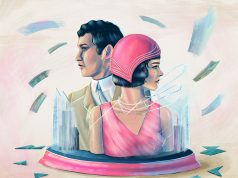By: Mariam Elhamy
If you’re interested in widening your scope and tapping into a different genre of books, then check out our list of 25 Arabic books that have been translated to English! Not everyone has the Arabic skills to delve into a novel, but guess what?? Now you can read Arabic literature and enjoy it, because these books are awesome!
The Thief and the Dogs

After four years in prison, the skilled young thief named Said Mahran emerges from captivity determined to seek revenge. He finds a world changed by a recent revolution and, on a more personal level, his beloved wife and his trusted henchman, who conspired to betray him to the police, are now married to each other and are keeping his six-year-old daughter from him. His mentor, Rauf Ilwan, who once convinced Said that stealing from the rich is an act of justice, is now himself a rich man and a respected newspaper editor who wants nothing to do with Said. As Said’s attempts to achieve justice backfire, he becomes a hunted man driven by hatred.
Season of Migration to the North
After years of study in Europe, the young man returns to his village along the Nile in post-colonial Sudan. Back home, he discovers a stranger among familiar faces – the enigmatic Mustafa Sa’eed. Mustafa takes the young man into his confidence, telling him the story of his own years in London, of his brilliant career as an economist, and of the series of deadly relationships with women that led to disaster and his eventual return to Sudan.
Arabian Love Poems

This translation of Nizar Kabbani’s poetry is accompanied by the Arabic texts of the poems. Kabbani’s writing embodies a direct, spontaneous, musical use of the language of everyday life. He was a campaigner for women’s rights, and his verses praise the beauty of the female body and love.
In the Country of Men

Set in 1979 in Libya, nine-year-old Suleiman’s days are full of the rituals of childhood: outings to the ruins surrounding Tripoli, games with friends, and exotic gifts from his father’s business trips abroad. However, his nights revolve around his mother’s disturbing bedside stories full of family bitterness. One day Suleiman sees his father across the square of a busy marketplace, his face wrapped in a pair of dark sunglasses. Wasn’t he supposed to be away on business? Why is he going into a strange building with the green shutters? Why is he lying?
Midaq Alley

Midaq Alley centers around the residents of one of the hustling, teeming back alleys of Cairo. From Zaita the cripple-maker to Kirsha the café owner with a taste for young boys and drugs, to Abbas the barber who mistakes greed for love, to Hamida who sells her soul to escape the alley, these characters vividly evoke the sights, sounds and smells of Cairo.
Women of Sand and Myrrh

A powerful and moving novel, by the Arab world’s leading woman novelist, about four women coping with the insular, oppressive society of an unnamed desert state.
The Locust and the Bird: My Mother’s Story

Married at a young age against her will, Kamila soon fell head-over-heels in love with another man and was forced to choose between her children and her lover. As the narrative unfolds through the years – from the bazaars, cinemas and apartments of 1930s Beirut to its war-torn streets decades later – the tale follows this passionate woman as she survives the tragedies and celebrates the triumphs of a life lived to the very fullest.
Girls of Riyadh

Alsanea’s tale of the personal struggles of four young upper-class women offers Westerners an unprecedented glimpse into a society often veiled from view. Living in restrictive Riyadh but traveling all over the globe, these modern Saudi women literally and figuratively shed traditional garb as they search for love, fulfillment, and their place somewhere in between Western society and their Islamic home.
The Corpse Washer

Young Jawad, born to a traditional Shi’ite family of corpse washers and shrouders in Baghdad, decides to abandon the family tradition, choosing instead to become a sculptor in order to celebrate life rather than tend to death. He enters Baghdad’s Academy of Fine Arts in the late 1980s, in defiance of his father’s wishes and determined to forge his own path. However, Saddam Hussein’s dictatorship and the economic sanctions of the 1990s destroy the socioeconomic fabric of society. The 2003 invasion and military occupation unleash violence and as the corpses pile up, Jawad returns to the inevitable washing and shrouding. He now must contemplate how death shapes daily life and the bodies of Baghdad’s inhabitants.
Only in London

Four strangers meet on a turbulent flight from Dubai to London: Amira, a canny Moroccan prostitute; Lamis, a 30-year old Iraqi divorcee; Nicholas, an English expert on Islamic art; and Samir, a Lebanese man who is delivering a monkey on a mission he doesn’t fully understand. Once safely on British soil, Lamis and Nicholas fall in love, Samir chases after blonde British youths, and Amira reinvents herself as a princess to better lure clients at the best London hotels. Through the city and across cultural borders, this novel gives readers an intimate look at the smells, sounds, and sights of London’s lively Arab neighborhoods.
The Woman from Tantoura

This novel tells a powerful human story, following the life of a young girl from her days in the village of al-Tantoura in Palestine up to the dawn of the new century. Ruqayya tries to make sense of all that has happened to her and her family as readers live her love of her land and of her people; and the repeated pain of loss, diaspora, cross-generational misunderstanding, and above all, the indomitable human spirit.
Palace Walk

Palace Walk is the first installment of Mahfouz’s Cairo Trilogy and introduces readers to the engrossing saga of a Muslim family in Cairo during Egypt’s occupation by British forces in the early 1900s.
Yalo

Yalo is a young man drifting between worlds like a stray dog on the streets of Beirut during the Lebanese civil war. Living with his mother, he falls in with a dangerous circle whose violent escapades he treats as a game. The game becomes a horrifying reality, however, when Yalo is accused of rape and armed robbery and is imprisoned. Tortured and interrogated at length, he is forced to confess to crimes of which he has little or no recollection. As he writes and rewrites his testimony, he begins to grasp his family’s past, and the true Yalo begins to emerge.
Gate of the Sun

Yunes, an aging Palestinian freedom fighter, lies in a coma. Keeping vigil at the old man’s bedside is his spiritual son, Khalil, who nurses Yunes, refusing to admit that his hero may never regain consciousness. Like a modern-day Scheherazade, Khalil relates the story of Palestinian exile while also recalling Yunes’s own extraordinary life and his love for his wife, whom he meets secretly over the years at Bab al-Shams, the Gate of the Sun.
White Masks

Why was the corpse of Khalil Ahmed Jâber found in the municipal garbage dump? Why had this civil servant disappeared weeks before his horrific death? Who was this man? A journalist begins to piece together an answer by speaking with his widow, a local engineer, the concierge, the garbage man who discovered him, the doctor who performed the autopsy, and a young soldier. Their stories emerge, along with the horrors of the bloody civil war and ravaging effects on the human psyche. With empathy and pain, Elias Khoury reveals the havoc the war has wreaked on Beirut and its inhabitants, as well as the resilience of a people.
Sarmada

Sarmada, Arabic for perpetuate or the eternally-not-changed, is the novels fictitious setting. In the title, Fadi Azzam creates a new word (a derivative female form of noun-verb, which does not exist in Arabic) and in so doing immediately lets the reader know that women are the protagonists of this story that spans several generations, from Syria to Paris and back again. The novel is set in the Druze area and is a declaration of love for tolerance and for the peaceful coexistence of the many religious groups that live in close proximity. Myths, communists, nationalists, murder, illicit love, superstition, erotic trees and women’s breasts make up the tapestry of this strange, beautifully written novel. Sarmada is direct, ruthless and full of fire.
Gold Dust

Gold Dust is a classic story of the brotherhood between man and beast, the thread of companionship that is all the difference between life and death in the desert. It is a story of the fight to endure in a world of limitless and waterless wastes, and a parable of the struggle to survive in the most dangerous landscape of all: human society.
The Yacoubian Building

This controversial novel reveals the political corruption, sexual repression, religious extremism, and modern hopes found in modern-day Egypt. All manner of flawed and fragile humanity reside in the Yacoubian Building, a once-elegant temple of Art Deco splendor now slowly decaying in the smog and bustle of downtown Cairo: a fading aristocrat and self-proclaimed “scientist of women”; a sultry, voluptuous siren; a devout young student, feeling the irresistible pull toward fundamentalism; a newspaper editor helplessly in love with a policeman; a corrupt and corpulent politician, twisting the Koran to justify his desires.
No Knives in the Kitchens of This City

In the once beautiful city of Aleppo, one Syrian family collapses into tragedy and ruin. The mother, abandoned by her husband, struggles to raise her children alone. Her daughter Sawsan flirts with the militias, the ruling party, and finally religion, seeking but never finding salvation. All are slowly choked in the fog of violence and decay, as their lives are plundered and their dreams wrecked by the brutal Assad regime.
Chicago
 An anti-establishment American professor of the sixties generation, whose relationship with a younger African-American woman becomes a moving target for intolerance; a veiled PhD candidate whose conviction in the code of her traditional upbringing is shaken by her exposure to American society; an émigré who has fervently embraced his new American identity, but who cannot escape his Egyptian roots when faced with the issue of his daughter’s ‘honor’; an Egyptian State Security informant who spouts religious doctrines while hankering after money and power; and a dissident student poet who comes to America with the sole aim of financing his literary aspirations, but whose experience in Chicago turns out to be more than he bargained for.
An anti-establishment American professor of the sixties generation, whose relationship with a younger African-American woman becomes a moving target for intolerance; a veiled PhD candidate whose conviction in the code of her traditional upbringing is shaken by her exposure to American society; an émigré who has fervently embraced his new American identity, but who cannot escape his Egyptian roots when faced with the issue of his daughter’s ‘honor’; an Egyptian State Security informant who spouts religious doctrines while hankering after money and power; and a dissident student poet who comes to America with the sole aim of financing his literary aspirations, but whose experience in Chicago turns out to be more than he bargained for.
The Tobacco Keeper

The story of the mysterious musician who became a legend: A captivating murder mystery that tells the remarkable history of twentieth-century Iraq.
Chaos of the Senses

In the midst of the Algerian civil war, Hayat is a young novelist trapped in a loveless marriage. While her husband, a high-ranking officer, preoccupies himself with politics, Hayat finds freedom from her highly regimented life in the world of her writing. There she weaves a passionate story for her characters. But the line between fiction and reality blurs when she falls for a man who seems to have walked straight out of the pages of her notebook, a man who seduces her, instead of her heroine, with his silence. In a place where those who dare to write the truth are made to pay a heavy price, she and her characters will discover that no one can truly be the author of their own destiny.
Cinnamon

After a bitter betrayal, Aliyah is banished from her mistress’ villa at dawn and sent back to the dusty alleyways of her childhood. Exhausted, both maid and mistress seek refuge in sleep and dream of their troubled childhoods, loneliness, love, and their lives together. A darkly humorous tale, Cinnamon portrays the inner world of two Damascene women and their search for security and tenderness from two opposing ends of the social scale.
Wild Thorns

A young Palestinian named Usama returns from working in the Gulf to support the resistance movement. His mission is to blow up buses transporting Palestinian workers into Israel. Shocked to discover that many of his fellow citizens have adjusted to life under military rule, Usama exchanges harsh words with his friends and family. Despite the uncertainty, he sets out to accomplish his mission … with disastrous consequences.
Miramar

The novel is set in 1960s Alexandria at the pension (boarding house) Miramar. The residents of the pension include its Greek mistress Mariana, and her servant, Zohra. As each character, in turn, fights for Zohra’s affections or allegiance tensions and jealousies arise. The story is retold four times from the perspective of a different resident each time, allowing the reader to understand the intricacies of post-revolutionary Egyptian life.






